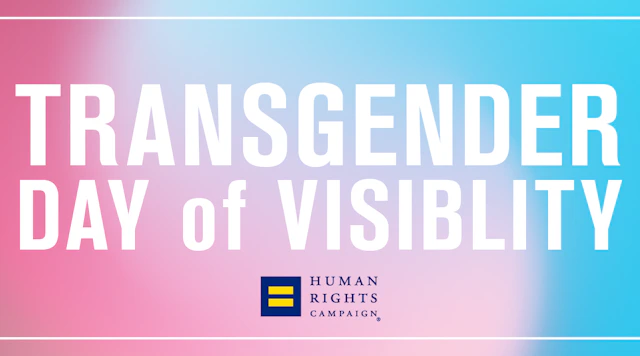Human Rights Campaign Celebrates Transgender Day of Visibility 2022
by Aryn Fields •

WASHINGTON—Today, the Human Rights Campaign (HRC), the nation’s largest lesbian, gay, bisexual, transgender and queer (LGBTQ+) civil rights organization, honors the International Transgender Day of Visibility (TDOV). Held annually on March 31, International Transgender Day of Visibility is a time to celebrate transgender and non-binary people around the globe and acknowledge the courage it takes to live openly and authentically. HRC & other advocates also use the day to raise awareness around discrimination and violence that trans people still face.
Transgender and non-binary people face countless challenges—and through it all, they have continued to fight for visibility, share their stories and organize for lived and legal equality. Transgender and non-binary people are our friends, our neighbors, our colleagues, our family, and our loved ones. As we celebrate International Transgender Day of Visibility, we must continue to shine a light on the epidemic of violence impacting Black and Brown transgender women and the discriminatory, dangerous bills being pushed through state legislatures around the country - bills that could prevent schools from being safe for trans and non-binary students, prevent trans student-athletes from playing sports, cut off access to age-appropriate, medically-necessary health care, and more. While these developments are frightening, we have a deep, confident hope that together we can defeat these attacks and move forward to a more equitable world for transgender and non-binary people.”
While we recognize our gains as a community this TDOV, we also know there is much more work to be done. Earlier this week, the HRC Foundation, in partnership with Civis Analytics, released Trans Lives & Positive Visibility: How News & Media Can Positively Cover Trans and Non-Binary Stories. This report gives new insight into how media coverage and broader “visibility” can both affect society’s perception of the transgender community as a whole, as well as transgender individuals. Further, it identifies how media sources may either intentionally, or inadvertently, perpetuate stigma towards trans and non-binary people in the stories that they cover and the way they cover them.
Transgender and non-binary people continue to face legislative and executive attacks across the United States. So far, in 2022, HRC is tracking 583+ pieces of potentially LGBTQ+-related legislation and, of those, atlmore than 310 are anti-LGBTQ+, and more than 135+ are specifically anti-transgender bills. Earlier this week in Florida, Gov. Ron DeSantis signed the so-called “Don’t Say Gay or Trans” bill (HB 1557) — discriminatory and dangerous legislation that seeks to silence teachers from talking about LGBTQ+ issues or people—into law. Iowa, South Dakota, and Utah have enacted laws this year that ban transgender girls from participating in sports, and seven other pieces of anti-LGBTQ+ legislation await action by governors in Arizona, Florida, Kentucky, Oklahoma, South Dakota, and Wisconsin. Additionally, last month, Texas Gov. Abbott and Texas Attorney General Paxton took unprecedented steps to prevent transgender youth from accessing best-practice, age-appropriate, medically necessary, gender-affirming care by threatening to charge parents and medical care providers of transgender children with child abuse.
As part of our efforts to combat anti-trans actions in Texas specifically, HRC will be joining with coalition partners for a Trans Day of Visibility Rally on the grounds of the Texas State Capitol. Texas has become a flashpoint in recent months, with lawless, groundless attacks on transgender youth and their families by Texas Gov. Greg Abbott and Atty. Gen. Ken Paxton. HRC previously worked with more than 60 major companies to speak out in opposition to these acts, and shared an open letter signed by thousands of parents of trans youth calling attention to the attacks on transgender people across the country.
While TDOV represents a much-needed opportunity to celebrate trans joy and uplift trans lives, we must pause to acknowledge the ongoing epidemic of violence against transgender and non-binary people, especially against Black and Brown transgender women. In November 2021, ahead of Transgender Day of Remembrance, the HRC Foundation released “An Epidemic of Violence: Fatal Violence Against Transgender and Gender Non-Conforming People in 2021,” a heartbreaking report honoring the trans people killed and detailing the contributing and motivating factors that lead to this tragic violence. Sadly, 2021 was the deadliest year yet on record, seeing at least 57 trans or gender non-conforming people in the U.S. fatally killed by violent means. In 2022, we have seen at least eight such deaths. We say at least because too often these stories go unreported -- or misreported.
To learn more about the Human Rights Campaign’s work on transgender equality, including the work done by its Transgender Justice Initiative, visit HRC.org/transgender. HRC offers a guide to reporters on how to cover transgender-related stories, which can be found here.
Contact Us
To make a general inquiry, please visit our contact page. Members of the media can reach our press office at: (202) 572-8968 or email press@hrc.org.
- Topics:
- Transgender
Love Conquers Hate
